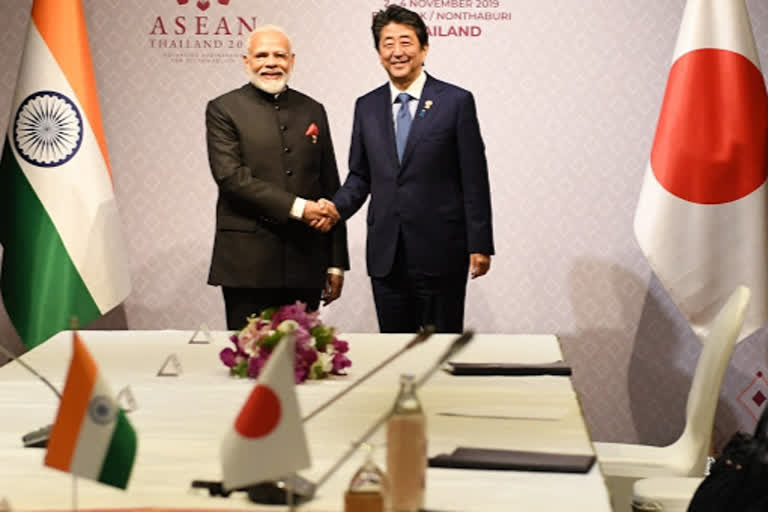New Delhi: Though India does not seek involvement of foreign powers in development projects in the Northeast, it was New Delhi's trust in Japanese Prime Minister Shinzo Abe, who resigned this week on health grounds, that led to Japan's engagement in projects in that region, a former Indian diplomat said.
"Traditionally, India has been very sensitive about involving foreign powers in the Northeast," Rajiv Bhatia, Distinguished Fellow at the Gateway House think tank and who served as India's Ambassador to Myanmar, told ETV Bharat.
"But New Delhi actually sought Japan's engagement in development of the Northeast," Bhatia, who regularly comments on Indo-Pacific affairs, said. "This is a clear indicator of India's trust in Abe's leadership."
The Indo-Pacific is a key area of cooperation between New Delhi and Tokyo and the northeastern region of India is seen as a pivot in this.
With Prime Minister Narendra Modi describing Japan as the cornerstone of India's Act East Policy and the two countries agreeing to work together in more concrete terms for the development of the Indo-Pacific region, the Northeast has emerged as a key link in this chain.
The Indo-Pacific region stretches from the east coast of Japan to the east coast of Africa and both India and Japan agree that the 10-nation Association of Southeast Asian Nations (ASEAN) regional bloc has to play a central role for the peace and prosperity of the region.
According to an India-Japan Vision Statement issued following the annual bilateral summit between Modi and Abe in Tokyo in 2018, both sides "reiterated their unwavering commitment to working together towards a free and open Indo-Pacific."
Read: Japan PM Abe resigns for health reasons
"The two leaders also affirmed that ASEAN unity and centrality are at the heart of the Indo-Pacific concept, which is inclusive and open to all," it stated.
Under the Act East Policy, the Northeast, which shares historical and traditional bonds with the ASEAN region, is seen as the springboard for India's increasing engagements with Southeast Asia and for this New Delhi has roped in Tokyo in a big way.
Bhatia said that Modi and Abe share a special friendship and described the years 2012-20 as the golden period of India-Japan ties.
He explained that there are three aspects to the India-Japan relationship that was elevated to that of a 'Special Strategic and Global Partnership' during Modi's visit to Tokyo in 2014: bilateral economic ties, special focus on the Northeast and countering China's growing influence in the Indo-Pacific.
"There are two aspects to the focus on the Northeast – development projects, and cultural and educational projects," Bhatia said. "Japan has a special affinity for the Northeast for historical reasons."
Read: India-Japan ties not against any third country: Expert
Though Japan has been working on development in the Northeast for some time, things got more energised with the launch of the India-Japan Act East Forum in December 2017.
The Forum aims to provide a platform for India-Japan collaboration under the rubric of New Delhi's Act East Policy and Tokyo's Free and Open Indo-Pacific Strategy. It seeks to identify specific projects for economic modernisation of the Northeast including those pertaining to connectivity, developmental infrastructure, industrial linkages as well as people-to-people contacts through tourism, culture and sports-related activities.
In June 2019, following a meeting between Minister of State (Independent Charge) for Development of Northeastern Region (DoNER) Jitendra Singh and a Japanese delegation led by then Japanese Ambassador to India Kenji Hiramatsu, Japan committed to invest 205.784 billion Yen (around Rs 13,000 crore) in several ongoing as well as new projects in different states of the Northeast.
Among the important projects that Japan will collaborate are the Guwahati Water Supply Project and Guwahati Sewage Project in Assam, Northeast Road Network Connectivity Improvement Project spread over Assam and Meghalaya, Northeast Network Connectivity Improvement Project in Meghalaya, Biodiversity Conservation and Forest Management Project in Sikkim, Sustainable Forest Management Project in Tripura, Technical Cooperation Project for Sustainable Agriculture and Irrigation in Mizoram and Forest Management Project in Nagaland.
Read: Sri Lanka always dependent on India for external security: Expert
With connectivity being an important area under India's Act East Policy, New Delhi is laying great stress on the development of infrastructure in the Northeast.
Japan's Free and Open Indo-Pacific Strategy too has connectivity as its focus as it calls for unimpeded movement of goods and services in the Indo-Pacific region - from eastern Africa to south Asia to southeast Asia to the western Pacific Ocean region and Japan.
Now, with India's northeastern region being seen as a key part of Tokyo's Indo-Pacific strategy, the Japan International Cooperation Agency (JICA) will provide an Overseas Development Assistance (ODA) loan of 25,483 million yen (around Rs 1,570 crore) for the construction of what will be India's longest bridge - a 19.3-km bridge over the river Brahmaputra connecting Dhubri in Assam in the north bank and Phulbari in Meghalaya in the south bank. The bridge falls under the Northeast Road Network Connectivity Improvement Project that Japan has identified for collaboration.
According to Bhatia, soft power is also being deployed to boost people-to-people ties between the two countries. Japanese tourists are drawn to the Northeast also for its natural attractions, Buddhist sites and tangible evocations of the Second World War. Lately, the growing of cherry blossom, the flower favoured by the Japanese, has been introduced in the state of Meghalaya.
Read: China's words don't reflect its actions against India: Ex-envoy
Bhatia said that it was Abe who came up with the idea of the Indo-Pacific region when he was Prime Minister of Japan in 2006-07.
India, along with Japan, the US and Australia, is part of a quad that is working for peace, prosperity and connectivity in the Indo-Pacific in the face of China's growing footprint in the region.
"Shinzo Abe will always be remembered for India-Japan cooperation at the macro level," Bhatia said.


